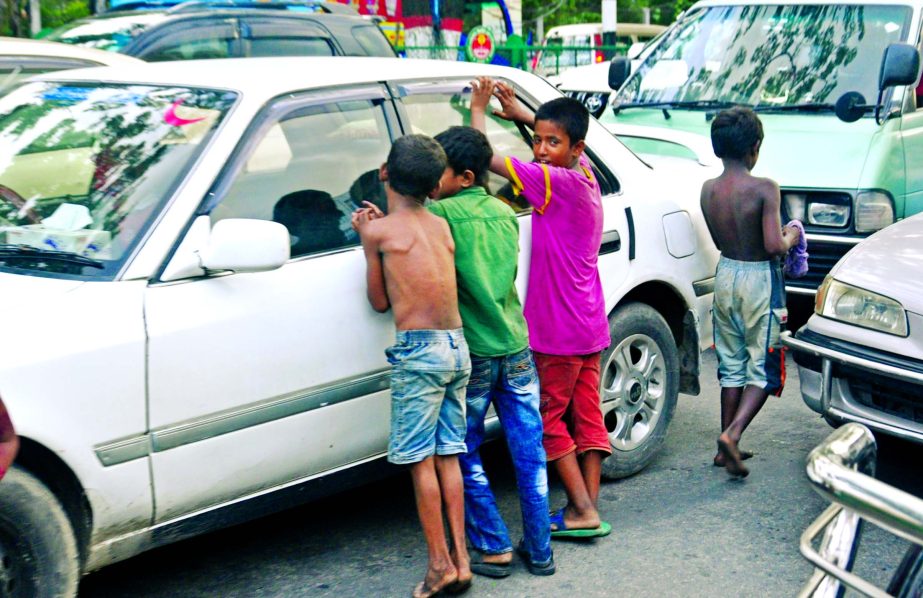
Sagar Biswas :Hundreds of professional beggars have started roaming across the capital city, including the beggars’ free diplomatic zones like Gulshan and Baridhara, to earn extra money ahead of Eid-ul Fitr. But the concerned ministry has not taken any initiative yet to prohibit begging.Beggars are now seen seeking alms frequently at bus stands, railway stations, markets, road-intersections, traffic signals, Motijheel, Gulistan, Shahbagh, Karwan Bazar and different other places.The Social Welfare Department had declared airport, diplomatic zone and Hotel Radisson areas under Dhaka North City Corporation as beggars’ free zone. Besides, three other areas – Sonargaon Hotel, Sheraton Hotel and Bailey Road under Dhaka South City Corporation — were also declared the same.Not only that, the Social Welfare Ministry in 2010 had planned to conduct a survey on beggars in Dhaka city in a bid to prepare a database with their photographs. But it is yet to see the day light. According to an approximate estimate, there are around 70,000 professional beggars in the city, which turns three times bigger ahead of Eid-ul Fitr and other festivals. If anyone goes through the roads of Gulshan or Baridhara by private car, public transport or rickshaw or even on foot, he would have to face a beggar. When contacted, Saida Ferdous Akhter, Project Director, Department of Social Welfare, told The New Nation on Sunday, “The government had taken a plan to rehabilitate the beggars. It is still going on….. We’ve planned to conduct mobile courts to make the city beggar free.” Momena, age around, 45, carries a baby during begging, whose age is more or less two months, is often seen around Baitul Mukarram Market. Her common dialogue: ‘This baby is starving for one day or since morning, I have no money to buy food for him.’ When asked, Momena said that her income is more than Tk 1000 -1500 daily.Some powerful crime syndicates are running the lucrative begging business by hiring elderly poor people, women and children from remote areas. In that case, a group of professional beggars engage their entire family members in this begging business.As per statistics provided by Bureau of Statistics, a beggar can earn minimum 4 or 5 kg rice in their whole day in urban areas. They sell it to their fixed shop and they take the money. In the cities, earning of a beggar varies from Tk 500 to Tk 1000 daily.Although the diplomatic zone has been declared free from beggars by the authority, the beggars are often seen collecting alms from the people. There is widespread allegation that begging becomes rampant in diplomatic zone due to indifference of relevant law enforcement agencies.”Begging has become a source of being affluent, a curse, a profession, a way of cheating and destruction to humanity. In fact, beggar is a profitable business in our country … the poor people, who have no job become beggar,” Anwara Rahman, an executive of an NGO, said.She said: “The beggars fill up their targets in the whole day and hand over the begging money to their bosses.”Usually, the members of beggars’ community come from different areas, particularly from slums, through the organized syndicates. Many of them are forced to beg, but in every case, physical disability is considered as an extra qualification to attract people’s sympathy. The beggars apply different techniques to run their business. Some sing songs, some tell stories, some recite poems and some play tune. But, most embarrassing is that beggars often taunt and misbehave with people if they are not given enough money.Sources close to the Social Welfare Ministry told The New Nation that begging has become a popular project for some influential people and they force particularly poor and disabled people in begging. “Some beggars have become affluent by occupying this profession. They also maintain a monetarily solvent life where several beggars have lands and buildings,” the sources said. Bangladesh Centre for Human Rights and Development [BCHRD] in a study conducted in 2013 said that more than 97 per cent beggars do not like their present way of life and they want to be rehabilitated in society. The Social Welfare Ministry had formulated a guideline to conduct the beggars’ survey by some ten NGOs under the guidance of Bangladesh Bureau of Statistics and with the cooperation of National Foundation for Development of the Disabled Persons. The Finance Ministry had also allocated Tk 12.47crore for the project titled ‘Beggars Rehabilitation Programme’. But the project did not proceed a bit. The Finance Ministry in 2015-16 fiscal year also allocated Tk 50 lakh for the same project. But the progress of the project is invisible.

